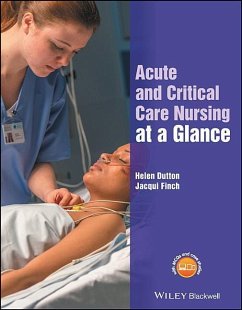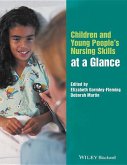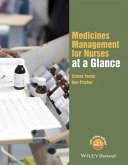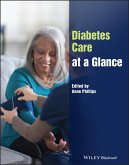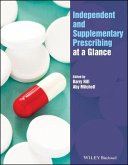Acute and Critical Care Nursing at a Glance
Herausgeber: Dutton, Helen; Finch, Jacqui
Acute and Critical Care Nursing at a Glance
Herausgeber: Dutton, Helen; Finch, Jacqui
- Broschiertes Buch
- Merkliste
- Auf die Merkliste
- Bewerten Bewerten
- Teilen
- Produkt teilen
- Produkterinnerung
- Produkterinnerung
From the publishers of the market-leading at a Glance series comes a comprehensive yet accessible overview of all the fundamental elements of acute and critical care nursing.
Andere Kunden interessierten sich auch für
![Wound Care at a Glance Wound Care at a Glance]() Ian Peate (Gibraltar Gibraltar Health Authority)Wound Care at a Glance48,99 €
Ian Peate (Gibraltar Gibraltar Health Authority)Wound Care at a Glance48,99 €![Children and Young People's Nursing Skills at a Glance Children and Young People's Nursing Skills at a Glance]() Children and Young People's Nursing Skills at a Glance53,99 €
Children and Young People's Nursing Skills at a Glance53,99 €![Infection Prevention and Control at a Glance Infection Prevention and Control at a Glance]() Debbie Weston (East Kent Hospitals NHS Trust, Kent, UK)Infection Prevention and Control at a Glance46,99 €
Debbie Weston (East Kent Hospitals NHS Trust, Kent, UK)Infection Prevention and Control at a Glance46,99 €![Nursing and Healthcare Research at a Glance Nursing and Healthcare Research at a Glance]() Nursing and Healthcare Research at a Glance45,99 €
Nursing and Healthcare Research at a Glance45,99 €![Medicines Management for Nurses at a Glance Medicines Management for Nurses at a Glance]() Simon Young (University of South Wales)Medicines Management for Nurses at a Glance46,99 €
Simon Young (University of South Wales)Medicines Management for Nurses at a Glance46,99 €![Diabetes Care at a Glance Diabetes Care at a Glance]() Diabetes Care at a Glance44,99 €
Diabetes Care at a Glance44,99 €![Independent and Supplementary Prescribing At a Glance Independent and Supplementary Prescribing At a Glance]() Independent and Supplementary Prescribing At a Glance44,99 €
Independent and Supplementary Prescribing At a Glance44,99 €-
-
-
From the publishers of the market-leading at a Glance series comes a comprehensive yet accessible overview of all the fundamental elements of acute and critical care nursing.
Hinweis: Dieser Artikel kann nur an eine deutsche Lieferadresse ausgeliefert werden.
Hinweis: Dieser Artikel kann nur an eine deutsche Lieferadresse ausgeliefert werden.
Produktdetails
- Produktdetails
- At a Glance (Nursing and Healthcare)
- Verlag: John Wiley and Sons Ltd
- Seitenzahl: 176
- Erscheinungstermin: 2. März 2018
- Englisch
- Abmessung: 270mm x 217mm x 9mm
- Gewicht: 522g
- ISBN-13: 9781118815175
- ISBN-10: 1118815173
- Artikelnr.: 48250691
- Herstellerkennzeichnung
- Libri GmbH
- Europaallee 1
- 36244 Bad Hersfeld
- gpsr@libri.de
- At a Glance (Nursing and Healthcare)
- Verlag: John Wiley and Sons Ltd
- Seitenzahl: 176
- Erscheinungstermin: 2. März 2018
- Englisch
- Abmessung: 270mm x 217mm x 9mm
- Gewicht: 522g
- ISBN-13: 9781118815175
- ISBN-10: 1118815173
- Artikelnr.: 48250691
- Herstellerkennzeichnung
- Libri GmbH
- Europaallee 1
- 36244 Bad Hersfeld
- gpsr@libri.de
Jacqui Finch is a Senior Lecturer in Adult Nursing at the University of West London, UK Helen Dutton is a Senior Lecturer in Adult Nursing at the University of West London, UK
Contributors vii
Acknowledgements viii
Preface ix
Abbreviations x
About the companion website xii
Part 1 Nursing in acute and critical care 1
1 Critical care without walls 2
2 Recognising risk of deterioration: ABCDE assessment 4
3 Early warning tools and care escalation 6
4 Hospital-acquired infection: infection prevention and control 8
5 Pain management 10
6 Psychosocial issues 12
7 Safe transfer of the acutely unwell patient 14
Part 2 Airway: maintaining airway patency 17
8 Upper airway: assessment and management 18
9 Advanced airway management 20
10 Airway management: tracheostomy 22
Part 3 Breathing: patients with breathing problems 25
11 Respiratory physiology: oxygenation 26
12 Respiratory physiology: ventilation 28
13 Assessment of breathing 30
14 Respiratory investigations 32
15 Oxygen therapy 34
16 Respiratory failure 36
17 Breathing problems: obstructive disorders 38
18 Breathing problems: lung (parenchymal) disorders 40
19 Breathing problems: pleural disorders 42
20 Respiratory support: non-invasive ventilation 44
21 Principles of thoracic surgery 46
Part 4 Circulation: patients with circulatory problems 49
22 Circulatory physiology 1: circulation 50
23 Circulatory physiology 2: the heart and cardiac cycle 52
24 Circulatory physiology 3: control of circulation 54
25 Assessment of circulation 56
26 Cardiac investigations 58
27 Fluid, electrolytes and intravenous fluids 60
28 Haemodynamic monitoring 62
29 Acute chest pain 64
30 The 12-lead electrocardiogram 66
31 Altered heart rhythm 68
32 Physiology of the immune system 70
33 Acute circulatory failure 1: distributive (sepsis) 72
34 Acute circulatory failure 2: distributive (anaphylaxis and neurogenic)
74
35 Acute circulatory failure 3: hypovolaemia 76
36 Acute circulatory failure 4: obstructive 78
37 Acute circulatory failure 5: heart failure 80
38 Principles of cardiac surgery 82
39 Physiology of the gastrointestinal system 84
40 Acute medical and surgical gastrointestinal problems 86
41 Physiology of the renal system 88
42 Acute kidney injury 90
43 Burns: immediate care 92
44 Major trauma 94
45 Resuscitation 96
Part 5 Disability: patients with neurological impairment 99
46 Physiology of the brain 100
47 Neurological assessment 102
48 Neurological impairment 104
49 Drug overdose and poisoning 106
50 Acute endocrine problems 108
Part 6 Exposure 111
51 Skin integrity 112
52 Nutritional assessment and support 114
Part 7 Decision making in acute and critical care 117
53 Summary of decision making 118
54 Professional, legal and ethical considerations 120
55 Mental health concerns 122
56 Last days of life 124
Appendix 126
References and further reading 127
Glossary 136
Index 148
Acknowledgements viii
Preface ix
Abbreviations x
About the companion website xii
Part 1 Nursing in acute and critical care 1
1 Critical care without walls 2
2 Recognising risk of deterioration: ABCDE assessment 4
3 Early warning tools and care escalation 6
4 Hospital-acquired infection: infection prevention and control 8
5 Pain management 10
6 Psychosocial issues 12
7 Safe transfer of the acutely unwell patient 14
Part 2 Airway: maintaining airway patency 17
8 Upper airway: assessment and management 18
9 Advanced airway management 20
10 Airway management: tracheostomy 22
Part 3 Breathing: patients with breathing problems 25
11 Respiratory physiology: oxygenation 26
12 Respiratory physiology: ventilation 28
13 Assessment of breathing 30
14 Respiratory investigations 32
15 Oxygen therapy 34
16 Respiratory failure 36
17 Breathing problems: obstructive disorders 38
18 Breathing problems: lung (parenchymal) disorders 40
19 Breathing problems: pleural disorders 42
20 Respiratory support: non-invasive ventilation 44
21 Principles of thoracic surgery 46
Part 4 Circulation: patients with circulatory problems 49
22 Circulatory physiology 1: circulation 50
23 Circulatory physiology 2: the heart and cardiac cycle 52
24 Circulatory physiology 3: control of circulation 54
25 Assessment of circulation 56
26 Cardiac investigations 58
27 Fluid, electrolytes and intravenous fluids 60
28 Haemodynamic monitoring 62
29 Acute chest pain 64
30 The 12-lead electrocardiogram 66
31 Altered heart rhythm 68
32 Physiology of the immune system 70
33 Acute circulatory failure 1: distributive (sepsis) 72
34 Acute circulatory failure 2: distributive (anaphylaxis and neurogenic)
74
35 Acute circulatory failure 3: hypovolaemia 76
36 Acute circulatory failure 4: obstructive 78
37 Acute circulatory failure 5: heart failure 80
38 Principles of cardiac surgery 82
39 Physiology of the gastrointestinal system 84
40 Acute medical and surgical gastrointestinal problems 86
41 Physiology of the renal system 88
42 Acute kidney injury 90
43 Burns: immediate care 92
44 Major trauma 94
45 Resuscitation 96
Part 5 Disability: patients with neurological impairment 99
46 Physiology of the brain 100
47 Neurological assessment 102
48 Neurological impairment 104
49 Drug overdose and poisoning 106
50 Acute endocrine problems 108
Part 6 Exposure 111
51 Skin integrity 112
52 Nutritional assessment and support 114
Part 7 Decision making in acute and critical care 117
53 Summary of decision making 118
54 Professional, legal and ethical considerations 120
55 Mental health concerns 122
56 Last days of life 124
Appendix 126
References and further reading 127
Glossary 136
Index 148
Contributors vii
Acknowledgements viii
Preface ix
Abbreviations x
About the companion website xii
Part 1 Nursing in acute and critical care 1
1 Critical care without walls 2
2 Recognising risk of deterioration: ABCDE assessment 4
3 Early warning tools and care escalation 6
4 Hospital-acquired infection: infection prevention and control 8
5 Pain management 10
6 Psychosocial issues 12
7 Safe transfer of the acutely unwell patient 14
Part 2 Airway: maintaining airway patency 17
8 Upper airway: assessment and management 18
9 Advanced airway management 20
10 Airway management: tracheostomy 22
Part 3 Breathing: patients with breathing problems 25
11 Respiratory physiology: oxygenation 26
12 Respiratory physiology: ventilation 28
13 Assessment of breathing 30
14 Respiratory investigations 32
15 Oxygen therapy 34
16 Respiratory failure 36
17 Breathing problems: obstructive disorders 38
18 Breathing problems: lung (parenchymal) disorders 40
19 Breathing problems: pleural disorders 42
20 Respiratory support: non-invasive ventilation 44
21 Principles of thoracic surgery 46
Part 4 Circulation: patients with circulatory problems 49
22 Circulatory physiology 1: circulation 50
23 Circulatory physiology 2: the heart and cardiac cycle 52
24 Circulatory physiology 3: control of circulation 54
25 Assessment of circulation 56
26 Cardiac investigations 58
27 Fluid, electrolytes and intravenous fluids 60
28 Haemodynamic monitoring 62
29 Acute chest pain 64
30 The 12-lead electrocardiogram 66
31 Altered heart rhythm 68
32 Physiology of the immune system 70
33 Acute circulatory failure 1: distributive (sepsis) 72
34 Acute circulatory failure 2: distributive (anaphylaxis and neurogenic)
74
35 Acute circulatory failure 3: hypovolaemia 76
36 Acute circulatory failure 4: obstructive 78
37 Acute circulatory failure 5: heart failure 80
38 Principles of cardiac surgery 82
39 Physiology of the gastrointestinal system 84
40 Acute medical and surgical gastrointestinal problems 86
41 Physiology of the renal system 88
42 Acute kidney injury 90
43 Burns: immediate care 92
44 Major trauma 94
45 Resuscitation 96
Part 5 Disability: patients with neurological impairment 99
46 Physiology of the brain 100
47 Neurological assessment 102
48 Neurological impairment 104
49 Drug overdose and poisoning 106
50 Acute endocrine problems 108
Part 6 Exposure 111
51 Skin integrity 112
52 Nutritional assessment and support 114
Part 7 Decision making in acute and critical care 117
53 Summary of decision making 118
54 Professional, legal and ethical considerations 120
55 Mental health concerns 122
56 Last days of life 124
Appendix 126
References and further reading 127
Glossary 136
Index 148
Acknowledgements viii
Preface ix
Abbreviations x
About the companion website xii
Part 1 Nursing in acute and critical care 1
1 Critical care without walls 2
2 Recognising risk of deterioration: ABCDE assessment 4
3 Early warning tools and care escalation 6
4 Hospital-acquired infection: infection prevention and control 8
5 Pain management 10
6 Psychosocial issues 12
7 Safe transfer of the acutely unwell patient 14
Part 2 Airway: maintaining airway patency 17
8 Upper airway: assessment and management 18
9 Advanced airway management 20
10 Airway management: tracheostomy 22
Part 3 Breathing: patients with breathing problems 25
11 Respiratory physiology: oxygenation 26
12 Respiratory physiology: ventilation 28
13 Assessment of breathing 30
14 Respiratory investigations 32
15 Oxygen therapy 34
16 Respiratory failure 36
17 Breathing problems: obstructive disorders 38
18 Breathing problems: lung (parenchymal) disorders 40
19 Breathing problems: pleural disorders 42
20 Respiratory support: non-invasive ventilation 44
21 Principles of thoracic surgery 46
Part 4 Circulation: patients with circulatory problems 49
22 Circulatory physiology 1: circulation 50
23 Circulatory physiology 2: the heart and cardiac cycle 52
24 Circulatory physiology 3: control of circulation 54
25 Assessment of circulation 56
26 Cardiac investigations 58
27 Fluid, electrolytes and intravenous fluids 60
28 Haemodynamic monitoring 62
29 Acute chest pain 64
30 The 12-lead electrocardiogram 66
31 Altered heart rhythm 68
32 Physiology of the immune system 70
33 Acute circulatory failure 1: distributive (sepsis) 72
34 Acute circulatory failure 2: distributive (anaphylaxis and neurogenic)
74
35 Acute circulatory failure 3: hypovolaemia 76
36 Acute circulatory failure 4: obstructive 78
37 Acute circulatory failure 5: heart failure 80
38 Principles of cardiac surgery 82
39 Physiology of the gastrointestinal system 84
40 Acute medical and surgical gastrointestinal problems 86
41 Physiology of the renal system 88
42 Acute kidney injury 90
43 Burns: immediate care 92
44 Major trauma 94
45 Resuscitation 96
Part 5 Disability: patients with neurological impairment 99
46 Physiology of the brain 100
47 Neurological assessment 102
48 Neurological impairment 104
49 Drug overdose and poisoning 106
50 Acute endocrine problems 108
Part 6 Exposure 111
51 Skin integrity 112
52 Nutritional assessment and support 114
Part 7 Decision making in acute and critical care 117
53 Summary of decision making 118
54 Professional, legal and ethical considerations 120
55 Mental health concerns 122
56 Last days of life 124
Appendix 126
References and further reading 127
Glossary 136
Index 148

